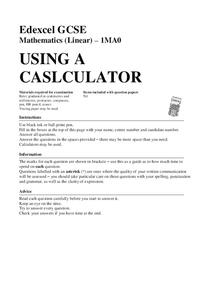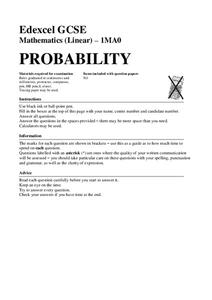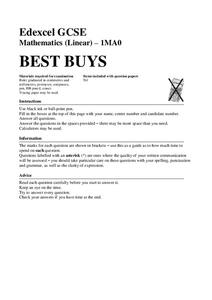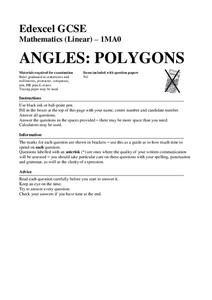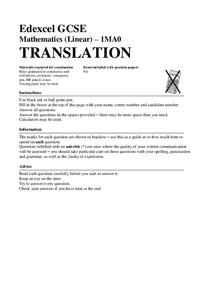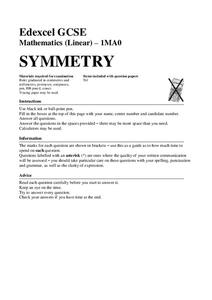Cerebellum
The American Civil War And Reconstruction: 1862-1869 - Emancipation Proclamation (1863)
American democracy has a lineage of written records that we can trace to show the development of our nation, and how each document builds on those before it to make our foundation of freedom stronger. This video looks at the documents...
Seeker
This Nuclear Robot Could Tunnel for Alien Life on Europa
This nuclear-powered tunneling robot could one day find life on Europa. Here’s how it works. Thumbnail image courtesy Alexander Pawlusik, LERCIP Internship Program, NASA Glenn Research Center. NASA’s Crazy Plan to Send a Space Submarine...
Corbett Maths
Constructing SSS Triangles
Creating a triangles is as easy as 5, 6, 7. Using a ruler and compass to measure off lengths, a short video shows how to construct a triangle with three specific side lengths. The example creates a triangle with side lengths of 5 cm, 6...
Mathed Up!
Two Way Tables
When presented with categorical data, a two-way frequency table is a great way to summarize the information. Pupils organize categorical data using a two-way table, then use the tables to determine missing data and to calculate simple...
Corbett Maths
Perpendicular Through a Point on a Line
Use one construction to complete a second. The short video shows how to incorporate the steps of a perpendicular bisector to create a perpendicular to a point on a line. With their own straightedges and compasses, classmates then...
Corbett Maths
Loci Part 1
Where can it go? The first video on loci develops a definition and provides some quick sketches of the loci of all points with given characteristics. The presenter does an example of the loci of points a given distance from an L shape.
Mathed Up!
Using a Calculator
Here's a video that presents several numerical expressions to be evaluated using a calculator.Viewers come to realize that sometimes it is not just a matter of punching in the numbers, but they also need to be concerned about how...
Mathed Up!
Pie Charts
Representing data is as easy as pie. Class members construct pie charts given a frequency table. Individuals then determine the size of the angles needed for each sector and interpret the size of sectors within the context of frequency....
Corbett Maths
Loci Part 2
Closer to this point and farther from that one. Continuing with loci problems, a short video shows how to work problems that are not straightforward. The presenter works loci problems that result in a region that meets several criteria.
Mathed Up!
Probability
How likely is it to draw a blue marble? Pupils find the likelihood of events and connect that to the probability of the event. They find the probabilities of simple events and show their probabilities on a scale.
Mathed Up!
Frequency Polygons
Frequency polygons are a different way to represent frequencies over intervals. Pupils take frequencies for intervals of data from a frequency table and plot them as a frequency polygon. Budding mathematicians find information about the...
Mathed Up!
Best Buys
Which scenario is the better deal? Class members examine nine scenarios to determine which choice offers a better deal. Pupils decide whether they need to find unit costs or total prices to compare the two options.
Mathed Up!
Angles in Polygons
Show your class that finding angle measures is a regular calculation with a resource that provides 12 problems dealing with the measures of angles in regular polygons. Pupils use formulas for the sum of measures of angles in a polygon to...
Mathed Up!
Reflections
Tracing paper is not just for art anymore — pupils can use it to find reflected images, too! Two videos show how to reflect images using tracing paper and find the reflection between the pre-image and image. Learners perform reflections...
Mathed Up!
Enlargements
Make enlargements with and without centers. Pupils work through seven problems dealing with dilations or enlargements. The first couple items are strict enlargements without centers, while the others have centers. Class members also...
Mathed Up!
Translations
Introduce translations as transformations that move figures in horizontal and vertical distances with a video that shows how to translate the figures. A second video covers how to determine the translation that has occurred. Pupils...
Mathed Up!
Symmetry
Eleven problems provide pupils the opportunity to find the lines of symmetry or identify rotational symmetry. Scholars alter designs to make them symmetrical, learn to recognize signs that are symmetrical, and identify the type of...
Mathed Up!
Stem and Leaf Diagrams
Order the data within a stem-and-leaf display. Pupils take data and create and ordered stem-and-leaf diagrams, including the key. Participants take their data and determine answers about the information. Class members then find...






